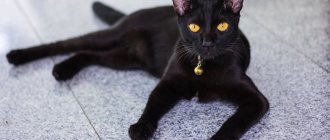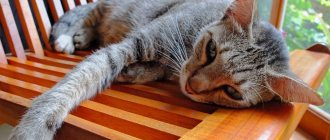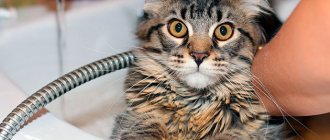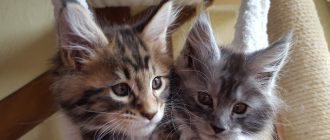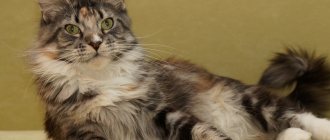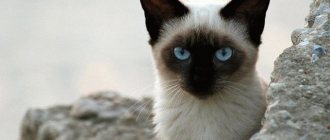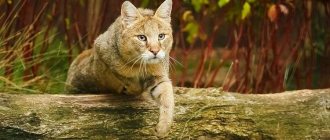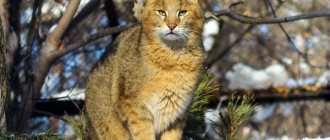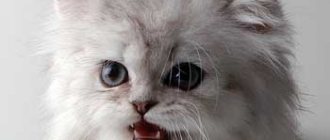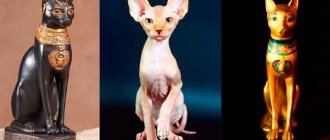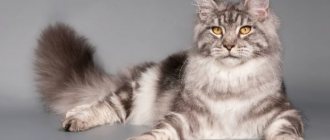The average lifespan of domestic cats is about 15-17 years. The key factors are the living conditions of the animal, the characteristics of the breed, proper care by the owner, and regular visits to the veterinarian.
There are also long-lived cats, living about 20-23 years; their record is often associated with high-quality care and an active lifestyle of the animal itself. How long do Maine Coons live at home?
There is a stereotype that purebred cats are more susceptible to diseases, need mild conditions and do not live long. Actually this is not true.
Representatives of the Maine Coon breed (North American semi-longhair cat) have proven that they are very resilient cats, but require careful care.
With proper care, the lifespan of Maine Coons is more than 12 years; despite their large size, North American semi-longhair cats have good health and are distinguished by their endurance.
According to veterinary clinics and insurance centers, about 50% of North American semi-longhair cats around the world live to the age of 16-17 years.
The rule that the larger the pet, the shorter it lives, applies only to dogs, not cats. The reason lies in the fact that the difference in size between a Maine Coon and an ordinary cat is not as great as between a shepherd dog and a Spitz. Therefore, you should not be afraid to get a large breed cat.
Cats
If you become the owner of a representative of a beautiful breed, then you are probably interested in the question: how long do Maine Coons live as cats at home? We can reassure all owners that with good care and love for their pet, the life of the pet will be long.
On average, Maine Coon cats live about 15-16 years. It is worth noting that females live 1-2 years longer than males. This fact is explained by the characteristics of the breed and natural immunity, which is higher in cats, because they are the ones who have to bear and feed the offspring.
Maine Coons are long-lived
In the United States, a record for life expectancy among Maine Coons was officially registered. The cat Koderoy was born in 1989 and managed to live about twice as long as the representatives of his breed. Success lay in proper nutrition and an active lifestyle, because the cat was by no means a homebody, he spent a lot of time outdoors and hunting. Factors influencing the average lifespan of Maine Coons
To ensure that your North American Longhair cat lives a long life, pay attention to the following factors:
- the pet’s health status (based on the characteristics of the breed, hereditary factors);
- the quality of the conditions in which the cat is kept (the presence of its own space, the absence of dangerous objects and substances in the public domain);
- proper care, including systematic visits to the veterinary clinic and preventive examinations.
What does life expectancy depend on?
The life expectancy of representatives of the Maine Coon breed is influenced by:
- Habitat. An animal lives 2–3 times less in an apartment than on the street. It is important to ventilate the living space and avoid strong humidity and drafts.
- Parents' health status. Diseases can be transmitted genetically and appear several months, or even years after the kitten is born.
- Nutrition. It is better to create a balanced natural diet based on the recommendations of specialists. From ready-made food, Maine Coon should choose holistic, premium and super-premium food. Feeding an animal with low-quality food causes deterioration in the functioning of the genitourinary system.
- Vaccination. Recommended injections will help reduce the risk of contracting the animal with various diseases and parasites, and will also strengthen the Maine Coon’s immune system.
- Sterilization. A correct and timely operation will reduce the chances of developing diseases of the reproductive system and protect against health problems that arise as a result of frequent births of kittens.
Maine Coons have fairly good health; the main congenital disease of the breed is considered to be joint problems - representatives of the European line of pets are susceptible to it.
Main causes of premature death
Representatives of the breed are susceptible to the following diseases:
- hypertrophic cardiomyopathy (a hereditary disease that occurs due to gene mutations that affects the contraction of the heart muscles);
- hip dysplasia (can make a young cat disabled and have great difficulty walking);
- back muscle atrophy;
- polycystic kidney disease (presence of cysts from birth that grow and lead to kidney failure).
Death at an early age is possible only from hereditary diseases, so it is extremely important to find a responsible breeder who strictly selects animals for breeding!
How to extend the life of a pet
Many people are interested in how long Maine Coons live at home and how to increase its duration. Proper nutrition, good care, proper maintenance, and compliance with safety rules play an important role. Animals have genetic diseases that are unique to this breed (diseases of the cardiovascular system, joint pathologies); timely prevention and therapy will help to avoid serious health problems.
Compliance with the following rules will help ensure a long life for your pet:
- Vaccinations, regular preventive examinations at the veterinarian;
- Proper nutrition - you can feed Maine Coons only with expensive, high-quality premium food, natural food should be rich in nutrients and vitamins, in some cases it is recommended to include food additives in the diet;
- Active lifestyle - Maine Coons must move, hunt, play, this will avoid excess weight gain and physical inactivity; you can purchase a sports complex with tunnels, shelves, posts, ladders in the store;
- Compliance with hygiene rules - constant care of the coat, claws, ears, eyes and teeth is necessary; lack of proper care is the prevention of many diseases;
- The room must be as safe as possible; the cat complex must be securely fixed so that a large cat does not overturn the structure and get hurt.
It is very important not to leave the cat unattended; Maine Coons are very curious, interested in everything they see.
It is recommended to install nets on windows; a fall from a great height can result in serious injuries and even death. Particular attention should be paid to the mating period; during this time, the behavior of individuals of both sexes changes greatly, so you should worry about finding a breeding partner in advance. Sometimes owners do not want to bother with the offspring and they give the cat hormonal drugs, which is strictly not recommended. Taking these medications has a negative impact on the health of cats, leading to obesity and the development of genital cancer.
To avoid such consequences, it is recommended to castrate or sterilize your pet in advance.
Disease Prevention
Many diseases that occur in Maine Coons can be avoided if a number of measures are taken in advance:
- a balanced diet, including premium food, fresh meat, vitamins, minerals, and sufficient water;
- compliance with the vaccination schedule for cats, systematic antiparasitic treatment for preventive purposes;
- spacious living space, maintaining an active lifestyle;
- reduction of stressful situations, for Maine Coons this means a change of housing, owner;
- hygienic care of animals;
- systematic observation by a veterinarian.
average life expectancy
The fears of future owners are based on the early removal of maikuns from nurseries: on average, this occurs at 4–5 years. In addition, many are concerned about discussions of a large number of diseases in this breed that appear on forums. It is worth noting that these fears are groundless and unfounded, and the average life expectancy of Meikuns is:
- cats live from 16 to 20 years;
- cats - from 13 to 17 years.
Cases of long-livers have also been recorded around the world: some representatives of this breed lived up to 20–22 years.
Important! Maine Coons are quite mobile and large in size, so in order to avoid serious injuries to the animal, it is important to minimize the pet’s access to easily breakable and breakable things in the apartment.
How many years do neutered Maine Coons live?
Most often, Maine Coons are neutered between 6 and 8 months of age, but some veterinarians recommend this procedure be performed at 4 to 5 months. A correctly and timely castration procedure will help increase your pet’s life expectancy by 1.5–2 times. This is due to the absence of stress associated with unsatisfied desire.
With the right food, Maine Coons are also less susceptible to urolithiasis, and therefore live longer.
Note! Do not forget that in some cases such an operation can lead to obesity resulting from excessive appetite, lethargy and the development of cancer-type diseases. In these cases, neutered fluffies live less.
What is their character?
Representatives of this breed rarely show it. These are reserved natures who know their worth. They don't turn up their noses, they just behave with dignity. Behind the stern look hides a kind soul. Large creatures have funny habits and are not prone to whims. They have the following features:
- peacefulness and goodwill,
- tact and delicacy,
- independence,
- playfulness and curiosity,
- calmness, quiet voice,
- purring resembles a beautiful melody,
- They never beg for food or steal it from the table, silently waiting for food.
Kittens are ready to frolic without ceasing, and adults do this in the mornings and evenings. During the daytime they prefer to rest. Females behave like true ladies. They show more tenderness and willfulness - either they allow the owner to caress them, or they stop his attempts to stroke or scratch behind the ear.
Care and maintenance
Keeping Maine Coon cats in your home is not difficult.
Despite the length and thickness of the fur, it does not mat, and the animals themselves are distinguished by rare cleanliness. They not only know how to keep order, but also try to lick their comrades.
It is enough to brush the animal only once a week to make it look especially luxurious. There is often no need to wash them for the same reason as already mentioned: they are extremely clean. It is necessary to monitor the ears, eyes and mouth of the animal, then it will have a well-groomed appearance. We must not forget about the beauty of his tail.
You should not trust the somewhat predatory look that every Maine Coon has in the photo taken. In former times, representatives of the breed often obtained their food by hunting. Therefore, they retained their fighting appearance and at the same time acquired the features of a cozy domestic cat. It's hard to believe that the contrast between their wild appearance and extraordinary friendliness is so great. If a representative of the Maine Coon breed lives in the house, then boredom is forgotten once and for all.
In addition to diseases caused by genetics, the health of the Maine Coon can also be threatened by those that arise due to improper nutrition and care. In this case, these are kidney stones (a generally quite common problem among cats), gum disease and gastrointestinal tract diseases. It is quite easy to prevent such troubles; it is enough to strictly follow the rules for keeping mains.
What to feed?
Dry food should only be premium class; if the cat is naturally fed, the products should be used only the freshest and highest quality. Meat should make up the majority of the diet: beef, chicken, rabbit, turkey. In addition to meat, Maine needs vegetables (cauliflower, carrots, pumpkin, beets, etc.).
What is prohibited?
The following products are prohibited:
- pork, fatty meat, smoked meats, sausages;
- sweets, candies, chocolate;
- chicken and fish bones;
- starchy vegetables (potatoes, etc.);
- legumes (beans, peas, etc.);
- any dishes from the host’s table, especially those with the addition of pepper and other spices.
Despite the widespread stereotype about the benefits of a fish table for cats, when feeding a cat of the “raccoon” breed, it is better to avoid fish. Its high fluoride content promotes kidney stone formation. A little sea fish is permissible, but not more than once every two weeks, and not if your cat is neutered.
Coat and color
Maine Coons are long-haired cats.
They have thick, shiny and silky fur. Guard hairs on different parts of the body have different lengths. The short ones cover the area of the head, shoulder blades and limbs, the longer ones grow closer to the tail. The belly, sides, “pants” and “collar” are quite fluffy.
The undercoat is well developed. It is soft to the touch, quite dense and waterproof.
Color – natural, varied. The most common wild colors are black and red marble, black tiger. In Russia, Maine Coons are often white and have various shades of agouti.
Artificial colors (lilac, chocolate, colorpoint, sorel, fawn) are not recognized by most felinological organizations, since they may be the result of interbreeding.
A characteristic feature of cats of this breed is thick and long hair! Short guard hairs grow only on the head and paws of the animal.
If a short-haired or smooth-haired individual is offered under the guise of a Maine Coon, it is likely that it is not a purebred.
How old does a cat live by human standards?
There are special tables that draw a parallel between the age of an animal and a person. No one dares to use such comparisons for serious research - they do not provide a true picture of development. Domestic cats live according to their own natural, not invented, schedule.
Each stage of a cat’s life (childhood, adolescence and beyond) begins and ends at a time that depends only on the breed’s qualities.
- Large Maine Coons mature only at the age of 4-5, and by this time the Scottish Fold has already lived almost half of his life.
- The Siberian cat is also known for its long youth, but at half a year it is already ready to bear offspring.
- Animals from the Thai group do not live long and mature quickly - it is completely incorrect to compare them with other breeds.
This table should be viewed solely for educational purposes in order to understand how long a cat can live at home and what level of the age ladder it is at.
| Cat | Human |
| 1 month | 1.7 years |
| 2 months | 3.5 years |
| 3 months | 5 years |
| 4 months | 7 years |
| 5 months | 8.5 years |
| 6 months | 10 years |
| 1 year | 15 years |
| 1.5 years | 20 years |
| 2 years | 24 years old |
| 3 years | 28 years |
| 4 years | 32 years |
| 5 years | 36 years |
| 7 years | 44 years old |
| 10 years | 56 years old |
| 12 years | 65 years old |
| 15 years | 76 years old |
| 17 years | 83 years old |
| 20 years | 90-100 |
Factors influencing development
The development of cats is influenced by the following internal and external factors:
- Floor. The male develops faster, grows larger and 2-3 kg heavier. Already at 3 months, boys are much heavier than girls.
- Mother's sizes. The larger the female, the faster the kittens grow in size.
- Genetic factors. Breeders note that kittens from the same litter develop at different rates. However, if you want to know how big your pet will grow, you need to look at the parents, or better yet, at the grandparents, if possible.
- Stress. The development of a kitten, especially when it has just arrived in the house, is affected by the stress of moving, a new environment, and a different diet. During this time, your pet may lose weight.
- Balanced kicking. Feeding a pregnant cat and her babies is also important.
- Conditions for physical exercise. Maine cats need exercise to develop and grow.
- Presence of diseases. Diseases suffered during a period of active growth, taking medications, especially antibiotics and hormones - all this can slow down development. For these reasons, there are cases when the size of an adult Maine Coon differs little from that of an ordinary cat.
Diet
The first thing you can do to potentially extend your Maine Coon's life is to provide him with a diet that is free of fat and comes from a high-quality dry formula. Ensuring that your cat is not overfed and that she maintains a healthy weight is the key to a happy and healthy pet.
These are big cats, and to keep their bodies slim, they need to pay special attention to their diet. Talk to your veterinarian about the appropriate diet for your Maine Coon based on his size and age. The amount and type of food a cat requires generally depends on its age and life stage.
